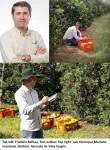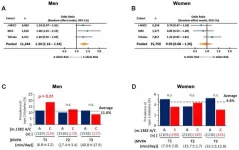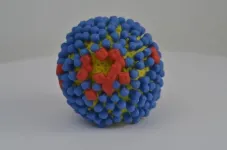INFORMATION:
The quick choice might be a choice-overload avoidance strategy
UB research says choosing quickly may be a sign of avoiding discomfort
2021-02-03
(Press-News.org) BUFFALO, N.Y. - A popular streaming service boasts a film inventory approaching 4,000 titles. When it's time to pick a movie, are you more likely to quickly make a decision or meticulously sift through the possibilities?
Psychologists refer to those who search minimally for something to arrive at an adequate choice as "satisficers." It's the "maximizers," meantime, who search exhaustively for what might be considered as the perfect option.
Previous studies exploring both strategies after making a choice often present satisficing as a more psychologically healthy alternative and even something to aspire to. And why not? Spending about as much time choosing a movie as it takes to actually watch it seems like the agonizing reality of someone incapable of choosing from a constellation of options.
But new research from the University at Buffalo that measured cardiovascular responses in the moment of making a choice, rather than after-the-fact, suggests the opposite: It's the satisficers who feel incapable, and what appears to be a speedy certainty might instead be a defense from having to think too deeply about the choices being presented to them.
"We might assume maximizers are having a negative experience in the moment, obsessing over the perfect choice. But it appears to be the satisficers - and that might be why they're satisficing," says Thomas Saltsman, a psychology researcher in the UB College of Arts and Sciences and the paper's lead author. "We found evidence that compared to maximizers, satisficers exhibited cardiovascular threat responses consistent with evaluating themselves as less capable of managing their choice in the moment."
The findings, published in the journal Psychophysiology, break with traditional wisdom. The implications are relevant not just to everyday decision making, but speak as well to how people approach significant choices, according to Mark Seery, an associate professor of psychology at UB, and one of the paper's co-authors.
"Anyone who has had the experience of maximizing and thought about the energy and stress saved by satisficing might want to rethink that position," says Seery. "There's a time and a place for satisficing, but people who do so as a defense against the agony of choice might not be prepared to make critical decisions when they have to."
Using a sample of 128 participants, the researchers first assessed everyone's decision-making style (maximizing vs. satisficing), before presenting them with 15 online personal profiles and accompanying cards with related biographical details. Participants had three minutes to choose their "ideal" person or partner. Afterward, they reported on their decision.
Unlike previous studies, the researchers measured cardiovascular responses to better understand participants' psychological experiences during their choice, a method Saltsman and Seery have used in previous work. In particular, they focused on how people experience two key motivational dimensions called task engagement and challenge/threat.
Task engagement describes how much people care about what they're doing, as indicated by how hard and fast the heart is pumping. Challenge/threat addresses how capable and confident someone feels in moments of stress. Confidence (challenge) causes arteries to dilate, a more efficient cardiovascular state than threat, or lack of confidence, which causes the arteries to constrict.
Saltsman says the team found no evidence that maximizers and satisficers differed in terms of task engagement, or how much importance they placed on their decisions.
"What we did find is that satisficers exhibited greater threat," he says. "It presents a novel view of satisficing, one that is more defensive, uncomfortable and reactionary in nature, rather than easy, expedient and carefree."
Saltsman says satisficers may search minimally through their options not because they are less particular or simply care less about their choices than maximizers, but because they feel incapable of choosing from so many options.
"Ultimately, whether we're the Netflix viewer who swiftly settles for the lame but relatable romantic comedy, or who scrolls endlessly through its bottomless offering list of content options, it's important to occasionally press the pause button and ask why we are approaching this decision the way we are," says Saltsman.
ELSE PRESS RELEASES FROM THIS DATE:
Research identifies more sustainable, cost-effective approach to treating citrus canker
2021-02-03
An important bacterial disease that affects citrus trees and causes lesions, citrus canker has been effectively controlled by spraying copper. However standard management techniques involve spraying excessive amounts of copper and water without consideration for the size of the trees.
"This technique resulted in a waste of resources as well as higher costs, detrimental environmental impact, and risk for development of copper resistant strains," explained plant pathologist Franklin Behlau, who recently published an article discussing a more sustainable approach to managing citrus canker.
Behlau and his colleagues showed that it is possible to control citrus canker by spraying ...
A team of climatologists is studying how to minimize errors in observed climate trend
2021-02-03
The instrumental climate record is the cultural heritage of humankind, the result of the diligent work of many generations of people all over the world. However, the changes in the way in which temperature is measured, as well as the environment in which weather stations are located can produce spurious trends. An international study carried out by researchers from the Universitat Rovira i Virgili (URV), the State Meteorology Agency and the University of Bonn (Germany) have succeeded in identifying the most reliable methods that help correct these trends. These "homogenization methods" are a key step in converting the enormous effort made by observers into reliable data about climate change. The results of this research, funded by ...
What the Biden-Harris administration means for chemistry
2021-02-03
The inauguration of Joe Biden and Kamala Harris marks a new era for science policy in the U.S. and beyond. The new administration has inherited a global pandemic and worsening climate change, among other science-related issues. A cover story in Chemical & Engineering News (C&EN), the weekly newsmagazine of the American Chemical Society, delves into what this means for chemists and chemistry as a whole.
One of the most pressing issues facing the Biden administration is the fight against climate change. Biden campaigned on net-zero emissions of greenhouse gases by 2050 and has laid out a sweeping plan to switch the U.S. to cleaner energy sources, which experts say ...
Biodiversity is its own catalyst -- to a point
2021-02-03
For decades, scientists have wrestled with rival theories to explain how interactions between species, like competition, influence biodiversity. Tracking microbial life across the planet, researchers from McGill University show that biodiversity does in fact foster further diversity in microbiomes that are initially less diverse. However, diversity rates plateau with increased competition for survival and space in more diverse microbiomes.
Published in eLife, the findings could help scientists better understand how microbiomes - communities of micro-organisms living together in particular habitats like humans, animals and plants or even soils and oceans ...
Aging-US: A pro-diabetogenic mtDNA polymorphism in mitochondrial-derived peptide
2021-02-03
C polymorphism is associated with susceptibility to T2D in men, possibly interacting with exercise, and contributing to the risk of T2D in sedentary males by reducing the activity of MOTS-c.
Dr. Noriyuki Fuku from The Juntendo University and Dr. Pinchas Cohen from The University of Southern California said, "The prevalence of type 2 diabetes mellitus (T2D) is growing dramatically."
While diabetes syndromes directly caused by mutations in mtDNA are extremely rare, several genetic analyses reveal that mtDNA polymorphisms contribute to T2D risk in both European ...
Aging-US: Screening Alzheimer's disease by facial complexion using artificial intelligence
2021-02-03
Aging-US published "Screening of Alzheimer's disease by facial complexion using artificial intelligence" which reported that despite the increasing incidence and high morbidity associated with dementia, a simple, non-invasive, and inexpensive method of screening for dementia is yet to be discovered.
This study aimed to examine whether artificial intelligence could distinguish between the faces of people with cognitive impairment and those without dementia.
121 patients with cognitive impairment and 117 cognitively sound participants were recruited for the study.
The binary differentiation of dementia / non-dementia facial image was expressed as a "Face AI score".
However, MMSE score showed significantly stronger ...
Aging-US: Sulforaphane promotes C. elegans longevity and healthspan
2021-02-03
Aging-US published "Sulforaphane promotes C. elegans longevity and healthspan via DAF- 16/DAF-2 insulin/IGF-1 signaling" which reported that the broccoli-derived isothiocyanate sulforaphane inhibits inflammation, oxidative stress and cancer, but its effect on healthspan and longevity are unclear.
The authors used the C. elegans nematode model and fed the wildtype and 9 mutant strains ±sulforaphane.
Sulforaphane increased the lifespan and promoted a health-related phenotype by increasing mobility, appetite and food intake and reducing lipofuscin accumulation.
Mechanistically, sulforaphane inhibited DAF-2-mediated insulin/insulin-like growth factor signaling and its downstream targets AGE-1, AKT-1/AKT-2. This was associated with increased nuclear translocation of ...
COVID-19 vaccination for patients with Parkinson's disease recommended
2021-02-03
Amsterdam, NL, February 3, 2021 - Patients with Parkinson's disease (PD) and healthcare professionals caring for them have expressed concerns about the COVID-19 vaccine's efficacy and safety in the specific context of PD and its symptomatic treatment. In a END ...
Intranasal influenza vaccine spurs strong immune response in Phase 1 study
2021-02-03
WHAT:
An experimental single-dose, intranasal influenza vaccine was safe and produced a durable immune response when tested in a Phase 1 study published in the Journal of Clinical Investigation. The investigational vaccine, called Ad4-H5-VTN, is a recombinant, replicating adenovirus vaccine designed to spur antibodies to hemagglutinin, a protein found on the surface of influenza viruses that attaches to human cells.
The investigational vaccine was developed by Emergent Biosolutions Inc., (Gaithersburg, Maryland). It was administered intranasally (28 study participants), as an oral capsule (10 participants) and via a tonsillar swab (25 participants) to ...
Extreme blood sugar swings in people with type 2 diabetes may increase heart disease risk
2021-02-03
BATON ROUGE, LOUISIANA - In patients with type 2 diabetes, big swings in blood sugar levels between doctors' visits are associated with an increased risk of heart disease.
The study, published in the journal Diabetes, Obesity & Metabolism, looked at more than 29,000 patients with type 2 diabetes over a two-year period. Patients who already had heart disease were excluded.
The American Diabetes Association recommends adults with diabetes maintain an A1c, the average blood sugar level over the past two to three months, of less than 7 percent to reduce complications from diabetes, such ...
LAST 30 PRESS RELEASES:
A promising potential therapeutic strategy for Rett syndrome
How time changes impact public sentiment in the U.S.
Analysis of charred food in pot reveals that prehistoric Europeans had surprisingly complex cuisines
As a whole, LGB+ workers in the NHS do not experience pay gaps compared to their heterosexual colleagues
How cocaine rewires the brain to drive relapse
Mosquito monitoring through sound - implications for AI species recognition
UCLA researchers engineer CAR-T cells to target hard-to-treat solid tumors
New study reveals asynchronous land–ocean responses to ancient ocean anoxia
Ctenophore research points to earlier origins of brain-like structures
Tibet ASγ experiment sheds new light on cosmic rays acceleration and propagation in Milky Way
AI-based liquid biopsy may detect liver fibrosis, cirrhosis and chronic disease signals
Hope for Rett syndrome: New research may unlock treatment pathway for rare disorder with no cure
How some skills become second nature
SFU study sheds light on clotting risks for female astronauts
UC Irvine chemists shed light on how age-related cataracts may begin
Machine learning reveals Raman signatures of liquid-like ion conduction in solid electrolytes
Children’s Hospital of Philadelphia researchers emphasize benefits and risks of generative AI at different stages of childhood development
Why conversation is more like a dance than an exchange of words
With Evo 2, AI can model and design the genetic code for all domains of life
Discovery of why only some early tumors survive could help catch and treat cancer at very earliest stages
Study reveals how gut bacteria and diet can reprogram fat to burn more energy
Mayo Clinic researchers link Parkinson's-related protein to faster Alzheimer's progression in women
Trends in metabolic and bariatric surgery use during the GLP-1 receptor agonist era
Loneliness, anxiety symptoms, depressive symptoms, and suicidal ideation in the all of us dataset
A decision-support system to personalize antidepressant treatment in major depressive disorder
Thunderstorms don’t just appear out of thin air - scientists' key finding to improve forecasting
Automated CT scan analysis could fast-track clinical assessments
New UNC Charlotte study reveals how just three molecules can launch gene-silencing condensates, organizing the epigenome and controlling stem cell differentiation
Oldest known bony fish fossils uncover early vertebrate evolution
High‑performance all‑solid‑state magnesium-air rechargeable battery enabled by metal-free nanoporous graphene
[Press-News.org] The quick choice might be a choice-overload avoidance strategyUB research says choosing quickly may be a sign of avoiding discomfort





